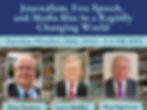IMAP Webinar: Experts Stress Need for Media Ethics
- khwang562
- Oct 28, 2025
- 2 min read
Updated: Nov 6, 2025

IMAP, United States – Two media experts addressed the need for ethical journalism and called for alliances to promote this goal in a webinar on October 28, 2025. The program, “Journalism, Free Speech and Media Bias in a Rapidly Changing World,” was organized by the International Media Association for Peace (IMAP), an affiliate of UPF-USA.
The first speaker was Mr. Larry Moffitt, vice president and executive director of the Washington Times Foundation and secretary general of UPF-North America. Mr. Moffitt decried the increasingly blurred line between news and opinion.
“Impartial news pages and a vigorously opinionated commentary section is the ideal ethic for our profession,” he said. “However, just the act of an editor selecting some stories to print and not selecting others, determines what issues will end up being talking points in the national agenda.” Mr. Moffitt compared print journalism with the internet, calling the internet the “wild West” where, without governing ethics, standards are all over the map.
Mr. Moffitt also discussed the erosion of values in the media, particularly television and movies. He believes this happened, in part, because of a lack of attention to what is sacred in the family. He posed the question whether the media have the responsibility to support and encourage healthy life values, as well as human freedoms. In response, he cited a quote from UPF co-founder Rev. Sun Myung Moon at a World Media Conference in the late 1980’s: “Before you are an editor or broadcaster, you are first a human being with a human being’s God-given responsibility to society.”
The second presenter was Mr. Peter Zoehrer, executive director of the Forum for Religious Freedom Europe and IMAP coordinator for Europe and the Middle East. Mr. Zohrer’s presentation was titled, “Media Bias and Democratic Freedoms: Protecting Religious Minorities.” Mr. Zoehrer referred to Articles 18 and 19 of the Universal Declaration of Human Rights and said that media bias is not merely sloppy journalism, but a human rights issue.
“A press that distorts realities doesn’t only mis-report – it shapes public perception, legitimizes repression and corrodes democracy from within,” he said. He cited specific examples of a global pattern of media bias against religion in Japan, South Korea, China, Hungary, India, Nigeria and Sub-Saharan Africa. He said that defending religious freedom is a shared responsibility, and urged listeners to pay attention to the issue.
Mr. Zoehrer listed the following guidelines for media professionals, including advice for the objects of their coverage:1. Journalists must verify facts before publishing, avoid stigmatizing labels, and let minorities speak for themselves. 2. Editors must treat headlines as promises, not hammers. 3. Regulators and public broadcasters must monitor systemic bias and ensure taxpayer funded media serves all citizens. 4. Faith communities and civil society must monitor coverage, respond factually, and share positive stories of peacebuilding, humanitarian aid and interfaith cooperation.
He closed by saying, “A free press should defend the vulnerable, not endanger them; it should challenge power, not echo it.”






